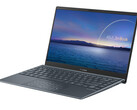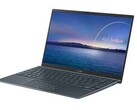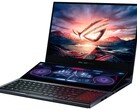The Ryzen 4000 mobile APUs are all the rage now, especially when talking about gaming laptops, and Asus was among the first to market this type of systems with the ROG Zephyrus G14. However, it looks like Asus is also expanding its lower-end laptop lineups with Ryzen 4000U processors. The guys over at Liliputing spotted new 14-inch ZenBooks and VivoBook Flip models, but Asus is not yet disclosing any pricing or availability information for these particular systems. Additionally, specs could differ from region to region.
First up is the ZenBook 14 UM425 that comes with a 400 nit 1080p screen (also a 250 nit version). Users may choose between Ryzen 5 4500U and Ryzen 7 4700U CPU options coupled with either 8 or 16 GB of LPDDR4x-3733 RAM and a PCIe 3.0 X2 NVMe SSD with capacities ranging from 256 GB to 1 TB. These models are essentially ultrabooks that weigh 2.5-2.7 lbs, so there are no dGPU options, but the Vega iGPUs are quite enough considering that Asus is not marketing them as gaming laptops. Port selection includes 2x USB-C 3.2 Gen 2 / 1x USB-A 3.2 Gen 1 connectors, an HDMI 2.0 output and a micro SD card reader. Other outstanding features are the IR camera with Windows hello integration and the numpad keys integrated in the trackpad area. It also comes with a 67 Wh battery.
The VivoBook Flip 14 TM420 is not as light, weighing in at 3.3 lbs, but it does offer one more CPU option, as well as the tablet mode via the 360-degree touchscreen, which comes with a pen. Users can choose among the Ryzen 3 4300U / Ryzen 5 4500U / Ryzen 7 4700U processors coupled with 8 or 16 GB of LPDDR4x-3200 RAM and a PCIe 3.0 NVMe SSD with up to 1 TB capacity. The battery is smaller, with only 50 Wh capacity, but the port selection also includes a USB 2.0 instead of an additional USB-C 3.2 Gen 2 connector, plus an audio jack.
Surprisingly, these two models also offer Wi-Fi 6 + Bluetooth 5.0 support, which is mostly reserved for Intel systems, so it may appear that Asus has tweaked AMD’s reference design.
I first stepped into the wondrous IT&C world when I was around seven years old. I was instantly fascinated by computerized graphics, whether they were from games or 3D applications like 3D Max. I'm also an avid reader of science fiction, an astrophysics aficionado, and a crypto geek. I started writing PC-related articles for Softpedia and a few blogs back in 2006. I joined the Notebookcheck team in the summer of 2017 and am currently a senior tech writer mostly covering processor, GPU, and laptop news.
> Expert Reviews and News on Laptops, Smartphones and Tech Innovations > News > News Archive > Newsarchive 2020 06 > Asus quietly introduces new ZenBook UM425 and VivoBook Flip TM420 14-inch laptops with Ryzen 4000U CPUs
Bogdan Solca, 2020-06-23 (Update: 2026-02-18)


















